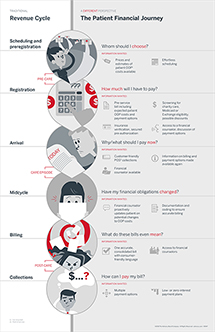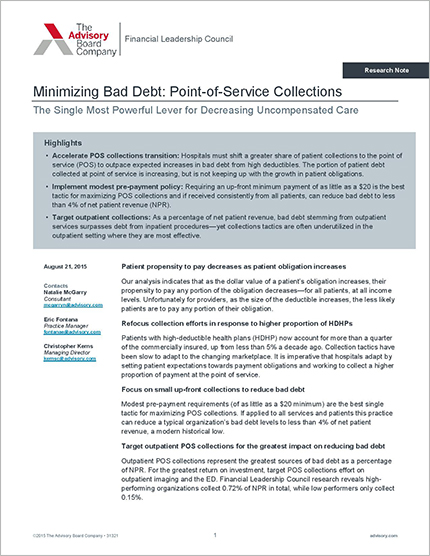Auto logout in seconds.
Continue LogoutMore Americans are turning to faith-based health care sharing ministries that provide cost-sharing arrangements to help cover members' medical bills, but some states have taken action amid complaints that members' medical bills are not being paid, Stephanie Armour and Anna Wilde Mathews report for the Wall Street Journal.
Background
Health care sharing ministries operate cost-sharing funds that help members pay for medical expenses. Members generally pay a fixed monthly fee that either is pooled into a general account or goes directly toward another individual's medical bill. Members then can submit medical bills to the fund to share the cost among the group.
However, not all medical bills are eligible for cost sharing, Armour and Wilde Mathews report. The ministries are not subject to state regulation and are exempt from Affordable Care Act (ACA) requirements, including the law's essential health benefit requirements. As a result, many of the health care ministries do not cover pre-existing conditions, preventive care services, mental health care services, or substance use disorder treatment. They also do not cover abortion services and certain types of birth control. In addition, the ministries set limits on the total amount they pay for treatments.
While there are no official figures on health care sharing ministries membership, the religious organizations and nonprofits offering such plans have reported substantial membership growth. For example, Samaritan Ministries International, a major faith-based health care sharing ministry, said the ministry's membership increased from 57,227 individuals in 2011 to 269,809 in 2019. More than one million people are believed to be health care sharing ministry members, Armour and Wilde Mathews report.
According to Armour and Wilde Mathews, faith-based health care sharing ministries grew in popularity over the past eight years for a number of reasons, including:
- New health care sharing ministries with less stringent faith-based requirements for enrollment;
- Increased marketing efforts;
- Individuals seeking more affordable health coverage alternatives amid rising exchange plan premiums; and
- Reduced competition, as some insurers have exited the ACA's exchanges, leaving individuals with fewer coverage options.
The increase in memberships also has driven revenue growth, Armour and Wilde Mathews report.
Samaritan Ministries reported revenues of about $40 million for fiscal year (FY) 2016 fiscal year, representing a more than 300% increase over FY 2013. Meanwhile, Christian Healthcare Ministries, one of the largest faith-based health care sharing ministries in the United States, saw its revenue reach more than $340 million in 2017, representing a more than 500% increase from 2013, while Liberty HealthShare, which has 239,000 members, saw its total review increase from $6.5 million in 2015 to $65 million in 2017.
More members file complaints, but there is little state officials can do
But state insurance regulators say they are receiving more consumer complaints about the health care sharing ministries over the ministries failing to pay their medical bills on time, or at all.
For example, the Ohio Attorney General's (AG) office has received 18 complaints regarding Liberty HealthShare so far this year. Jonathan Horgan in a complaint filed with the office in April claimed that Liberty HealthShare failed to immediately reimburse $153.60 for a valid service, after he had already paid $4,200 over a six-month period in health care costs. Horgan's complaint stated that Liberty HealthShare was "over 90 days late" in paying the claim, and the ministry was not responding to his emails.
Rachel Payne, a former member of Liberty HealthShare, filed a similar complaint over a bill the ministry paid late. Ultimately, she said, "The concept [of the health care sharing ministry] is really a great idea, but you have to have a system that works."
However, there typically is little state officials can do to remedy the complaints, because the ministries are not regulated by state insurance commissioners and many states have passed legislation protecting the ministries from state oversight, Armour and Wilde Mathews report.
In Nebraska, the state's Department of Insurance last year warned state residents that health care sharing ministries cannot be required to pay a member's bill and are not regulated health plans.
Washington's state insurance commissioner last month ordered the health care sharing ministries Aliera Healthcare and Trinity HealthShare to stop enrolling members in their plans, claiming that Aliera Healthcare's advertisements could mislead consumers to believe their products are regulated health insurance plans, and that Trinity was not a legitimate ministry, the Armour and Wilde Mathews report. State regulators in Texas made similar allegations against Aliera and Trinity, according to Armour and Wilde Mathews.
Mike Kreidler, Washington's insurance commissioner, said the state also has launched an investigation into health care sharing ministries to determine their authenticity. "There are some other opportunists in the insurance business who are attempting to take advantage of what they perceive as a loophole," he said.
The Ohio AG's office declined to comment on whether it is conducting an investigation into the complaints it has received, Armour and Wilde Mathews report.
Health care ministries push back
But the health care ministries have argued that the increase in complaints is insignificant considering their sharp rise in members. The ministries said they tell their members they are not purchasing actual health insurance plans, and they provide their members with an appeals process for denied claims.
Anthony Hopp, a spokesperson for Samaritan Ministries, said the ministry attempts to make the distinction between health insurance and health care ministries. "[W]e constantly try … to make clear that we are not insurance," Hopp said.
Aliera said it plans to "vigorously defend" itself "against the false claims" made by state regulators, and Trinity said it is a legitimate health care ministry and is challenging the allegations made by Texas regulators.
Liberty HealthShare said the issues raised in complaints filed by its members have been addressed. For example, Liberty HealthShare said it had reissued a check to Payne after learning that she had not received the first one it had issued to pay her claim, and it renegotiated the charges for Horgan's bill to a lower rate. The ministry said it paid the bill within 114 days.
Liberty HealthShare also noted that members who are having difficulty reaching the health ministry might have attempted to call when the ministry was experiencing technical problems. Liberty HealthShare said it is continuing to take steps to improve how quickly it responds to its members. Terrie Ipson, a spokesperson for Liberty HealthShare, said, "We care deeply about our 239,000 members all across the country, and in 2018 we facilitated the sharing of over $315 million in medical expenses" (Armour/Wilde Mathews, Wall Street Journal, 6/10; Owens, "Vitals," Axios, 6/11).
Don't miss out on the latest Advisory Board insights
Create your free account to access 1 resource, including the latest research and webinars.
Want access without creating an account?
You have 1 free members-only resource remaining this month.
1 free members-only resources remaining
1 free members-only resources remaining
You've reached your limit of free insights
Become a member to access all of Advisory Board's resources, events, and experts
Never miss out on the latest innovative health care content tailored to you.
Benefits include:
You've reached your limit of free insights
Become a member to access all of Advisory Board's resources, events, and experts
Never miss out on the latest innovative health care content tailored to you.
Benefits include:
This content is available through your Curated Research partnership with Advisory Board. Click on ‘view this resource’ to read the full piece
Email ask@advisory.com to learn more
Click on ‘Become a Member’ to learn about the benefits of a Full-Access partnership with Advisory Board
Never miss out on the latest innovative health care content tailored to you.
Benefits Include:
This is for members only. Learn more.
Click on ‘Become a Member’ to learn about the benefits of a Full-Access partnership with Advisory Board
Never miss out on the latest innovative health care content tailored to you.


